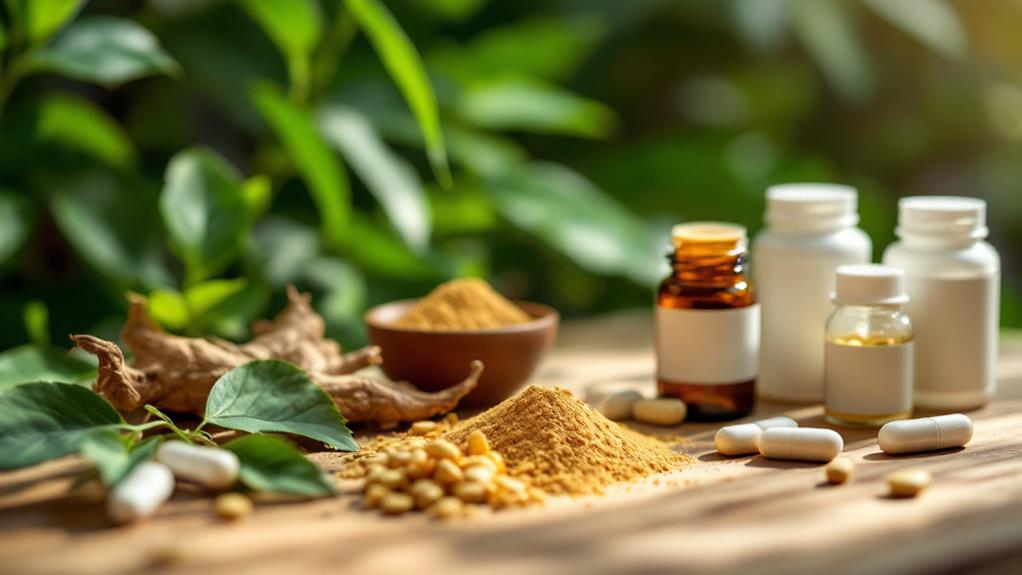Everything You Need to Know About Ashwagandha: Benefits and Uses

Ashwagandha, a key part of Ayurvedic medicine, is celebrated for its adaptogenic properties and bioactive compounds, like withanolides. You'll find it improves energy, reduces stress, and enhances sleep quality. It's also known to elevate testosterone, support reproductive health, and provide anti-inflammatory benefits. Typical dosages range from 250 to 600 mg daily, but starting slowly helps minimize side effects like stomach upset. Consult a healthcare provider if you have health conditions or take medications, as ashwagandha might interact with certain drugs. There's much more to investigate about its extensive benefits and intriguing uses.
What Is Ashwagandha?
Ashwagandha, scientifically known as Withania somnifera, is an evergreen shrub you'll find native to regions like India, Africa, and the Middle East. It's a cornerstone of Ayurvedic medicine, valued for its restorative properties. You might've heard it called Indian ginseng or winter cherry. The roots of ashwagandha are famous for their distinct odor, reminiscent of a wet horse, which signals its potency.
As an adaptogenic herb, ashwagandha is rich in bioactive compounds, particularly withanolides and alkaloids. These compounds are essential players in helping you manage stress and anxiety. They work by supporting your body's ability to adapt to stressors, making this herb a natural ally in coping with life's pressures.
The name "somnifera" translates to "sleep-inducing," which underscores its historical use in promoting relaxation and enhancing sleep quality. This characteristic makes it a natural choice for those seeking tranquility and restfulness.
Beyond stress relief, ashwagandha is recognized as a Rasayana in Ayurveda, which means it plays a fundamental role in promoting general health, energy, and longevity. By incorporating this herb into your routine, you're nurturing your body's resilience and energy.
Traditional Uses
In the domain of traditional medicine, ashwagandha stands out as a powerful ally in promoting vigor and resilience. Known scientifically as Withania somnifera, it's deeply rooted in Ayurvedic medicine, a system that has harnessed its potential for centuries. Ashwagandha is cherished for its ability to strengthen vitality and provide a buffer against stress, anxiety, and the inevitable march of time. As a Rasayana, it's believed to rejuvenate both body and mind, improving longevity and promoting comprehensive well-being.
You'll find that ashwagandha has many traditional uses:
- Energy Improvement: It's often used to elevate energy levels and combat fatigue.
- Stress and Anxiety Alleviation: Many turn to it for its calming effect, reducing symptoms of anxiety and stress.
- Reproductive Health: It supports reproductive health and can improve sexual function in both men and women.
- Longevity and Well-being: Regular use is thought to contribute to a longer, healthier life.
The roots of this plant, with their unique horse-like scent, are a reflection of its calming and grounding effects. As you investigate Ayurvedic practices, you'll uncover the myriad ways ashwagandha can support your health expedition, underscoring its timeless appeal.
Health Benefits

Having investigated ashwagandha's rich history in traditional medicine, it's time to examine its scientifically-backed health benefits. Ashwagandha's ability to reduce stress and anxiety is well-documented. Studies show that daily doses of 500-600 mg can markedly lower perceived stress and cortisol levels, the hormone linked to stress. This makes it a natural ally in improving your comprehensive well-being.
Beyond stress relief, ashwagandha can increase your sleep quality. Research found that 72% of participants experienced improved sleep after taking ashwagandha, compared to just 29% in a placebo group. If you're struggling with sleep, this herb might be a worthy supplement to your bedtime routine.
For men, ashwagandha may also raise testosterone levels, with studies indicating a 14.7% rise in males between 40-70. This could lead to better sperm concentration and motility, offering reproductive benefits.
Moreover, ashwagandha is known for its anti-inflammatory properties and ability to lower blood sugar levels. Reviews of studies reveal considerable reductions in blood glucose and HbA1c among users. In addition, it improves cognitive function, enhancing memory, attention, and executive functioning, especially in senior adults and those with schizophrenia.
Stress and Anxiety Relief
While stress and anxiety can be overwhelming, ashwagandha offers a natural remedy with proven results. This powerful herbal medicine has been shown to considerably reduce stress and anxiety symptoms. Clinical trials indicate that doses of ashwagandha, specifically 500-600 mg per day, can improve psychological well-being and lower cortisol levels in adults. By modulating these cortisol levels and regulating the hypothalamic-pituitary-adrenal (HPA) axis, ashwagandha effectively elevates your mental resilience, helping you manage stress more effectively.
Research highlights the effectiveness of ashwagandha:
- A systematic review involving 491 participants showed substantial reductions in perceived stress and anxiety symptoms.
- A study on schizophrenia patients demonstrated improvements in depression and anxiety with 1,000 mg of ashwagandha daily for 12 weeks.
- Clinical trials confirmed that 72% of participants experienced improved sleep quality after ashwagandha treatment.
As you navigate daily challenges, ashwagandha can be a valuable ally in your stress relief toolkit. Its ability to improve mental resilience and enhance psychological well-being offers a natural path toward a calmer state of mind. Consider incorporating this herbal remedy into your routine to see if it alleviates your stress and anxiety symptoms.
Impact on Sleep

Beyond its role in stress relief, ashwagandha also plays an important part in improving sleep quality. Clinical studies indicate that ashwagandha supplementation can greatly enhance sleep, as seen in trials where 72% of participants reported better sleep compared to just 29% in the placebo group. This herb's adaptogenic properties help regulate cortisol levels, which can be vital in managing insomnia and promoting healthier sleep patterns.
Research shows ashwagandha's effectiveness in reducing sleep onset latency, enabling quicker sleep for those struggling with insomnia. A systematic review of five studies highlighted a notable improvement in sleep quality, especially with higher doses (600 mg/day) and extended treatment durations of eight weeks. This suggests that consistent supplementation can lead to more considerable benefits over time.
Interestingly, participants experiencing improved sleep quality also reported better mental alertness during the day. This connection underscores the significance of restful sleep in maintaining daily cognitive function. Ashwagandha serves not only as a sleep aid but also as an enhancer for daytime mental clarity. By incorporating ashwagandha into your routine, you might find a natural ally in achieving better sleep and increased alertness.
Dosage Guidelines
Determining the right dosage of ashwagandha is crucial for maximizing its benefits while minimizing potential side effects. When evaluating ashwagandha for stress reduction, daily dosages typically range from 250 to 600 mg. Clinical studies have even examined doses up to 1,250 mg for specific health conditions like hormonal balance and fertility. However, deciding on the correct dosage isn't a one-size-fits-all situation. Your individual health needs should guide your dosage, making it important to consult with a healthcare professional.
Here are some dosage guidelines to reflect on:
- Start Low: Begin with a lower dosage to minimize gastrointestinal side effects.
- Monitor Effects: Gradually increase the dosage as tolerated, keeping an eye on how your body reacts.
- Form Variation: Ashwagandha comes in different forms—capsules, powders, gummies, and liquid extracts—which allows for flexibility in choosing what's best for you.
- Professional Advice: Always seek advice from a healthcare professional to tailor the dosage to your specific health conditions and needs.
It's also wise to be mindful that herbal products like ashwagandha can interact differently based on individual health. As a result, starting slow and consulting a professional guarantees both safety and effectiveness.
Side Effects

After finding the right dosage of ashwagandha, it's essential to be aware of potential side effects that might arise. Although ashwagandha is generally well-tolerated, some individuals experience mild gastrointestinal issues, like stomach upset, diarrhea, and nausea. These side effects are typically manageable but should be monitored.
High doses of ashwagandha can cause drowsiness, so proceed with caution if you're driving or operating heavy machinery. Serious side effects, though rare, have been noted, including liver dysfunction and acute liver injury. If you have liver disease, exercise caution and consult your healthcare provider before starting ashwagandha.
Pregnant or breastfeeding individuals should avoid ashwagandha due to potential risks to fetal and infant health. If you're taking thyroid medications, antidiabetes drugs, or sedatives, it's significant to consult a healthcare professional. Ashwagandha may interact with these medications, potentially altering their effectiveness or causing unexpected side effects.
Safety Precautions
When considering ashwagandha, it's vital to prioritize safety precautions to guarantee a beneficial experience. Although ashwagandha is generally well tolerated for short-term use, with studies indicating safety for up to three months, its long-term effects haven't been adequately studied. It's significant to be aware of potential risks, especially if you're pregnant or breastfeeding, as safety during these periods remains unestablished. Moreover, individuals with existing health conditions should exercise caution.
Here's what to keep in mind:
- Autoimmune diseases and thyroid issues: If you have these conditions or are taking medication for thyroid function, consult a healthcare professional and obtain medical supervision.
- Gastrointestinal upset: High doses of ashwagandha might cause nausea or diarrhea. It's vital to discuss appropriate dosage with your doctor.
- Liver dysfunction: Although rare, there have been reports of serious liver injuries. Monitor your health closely if you have pre-existing liver conditions.
- Pregnant and breastfeeding: Avoid ashwagandha during these periods due to potential risks.
Interactions With Medications

While evaluating the safety precautions associated with ashwagandha, it's likewise significant to understand its interactions with medications. If you're taking sedative medications, be aware that ashwagandha might improve their effects, potentially causing increased drowsiness or sedation. This can complicate tasks requiring your full attention, so extra caution is needed.
For those managing thyroid issues, ashwagandha can affect thyroid function. It may interact with thyroid medications, necessitating careful monitoring of your thyroid hormone levels. Verify that your healthcare provider is informed about your use of ashwagandha to adjust your medication if necessary.
Ashwagandha's ability to lower blood sugar is another interaction to take into account. If you're on diabetes medications, this could lead to hypoglycemia, a condition where your blood sugar drops too low. Regular monitoring of blood sugar levels becomes essential, and discussing this with your healthcare provider is recommended.
Additionally, ashwagandha may influence your immune response. If you're taking immunosuppressive drugs, it's vital to recognize that ashwagandha might counteract these medications. Always consult with your healthcare provider before starting ashwagandha, especially if you're on prescriptions affecting your central nervous system, thyroid, or blood sugar levels.
Future Research Directions
As research on ashwagandha progresses, it's clear that there's a need for larger multicentric trials to truly comprehend its clinical efficacy across diverse health conditions. You're probably aware that most current studies focus on short-term use, often not exceeding three months. However, to guarantee we truly understand ashwagandha's potential, investigations into its long-term safety and effectiveness are crucial. This will help determine its role in managing chronic conditions like neurodegenerative diseases and autoimmune disorders.
Future research should also explore the molecular mechanisms of ashwagandha's active compounds, such as withanolides. Understanding these can improve the standardization of extracts, assuring consistent therapeutic outcomes. Additionally, the potential interactions with medications and its effects on populations with hormone-sensitive conditions require careful examination.
In summary, the future research directions for ashwagandha should include:
- Larger multicentric trials to verify clinical efficacy across diverse health conditions.
- Exploration of active compounds to understand molecular mechanisms.
- Studies on long-term safety and effectiveness, beyond short-term use.
- Investigations into interactions with medications and effects on specific populations.
These steps will solidify ashwagandha's place in modern therapeutic practices.




